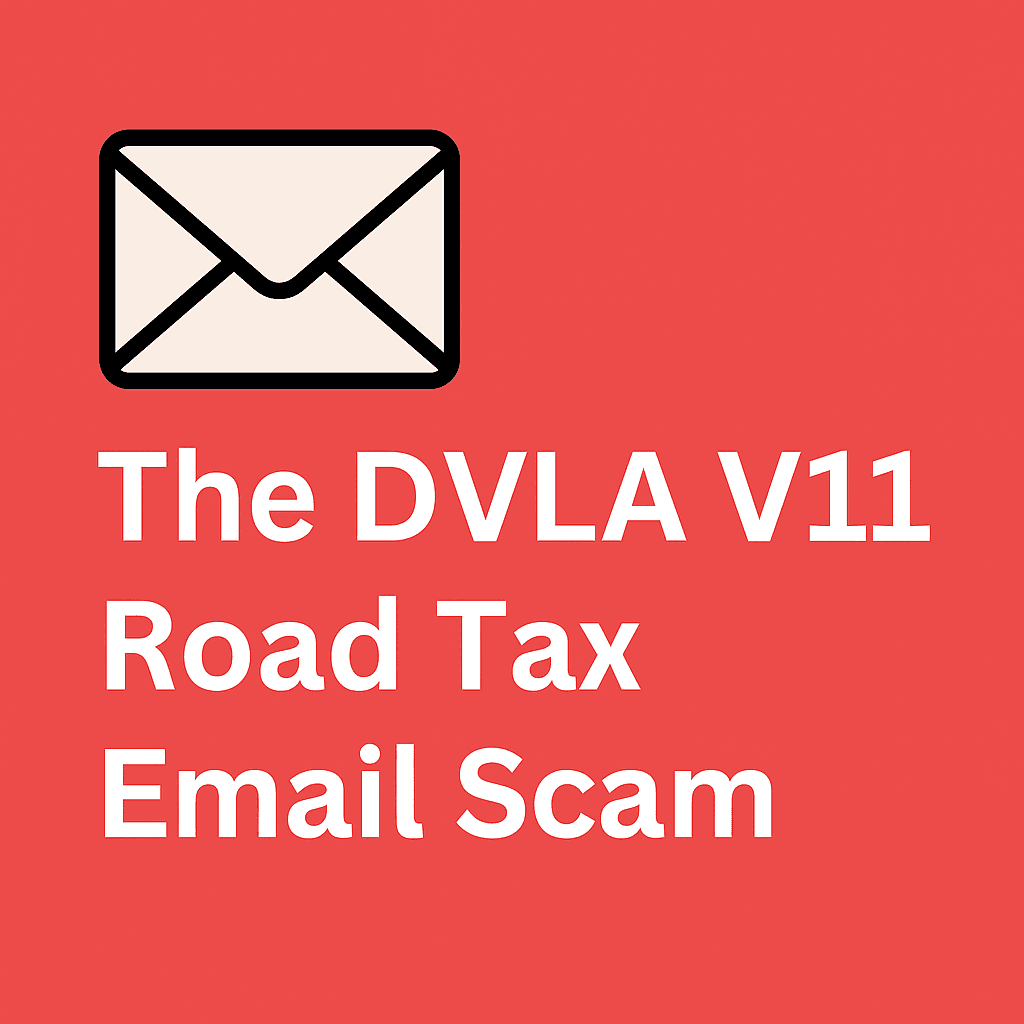Scammers are once again impersonating the DVLA in a new phishing scam designed to trick vehicle owners into handing over their personal and financial details.
This latest road tax scam email falsely claims that the recipient’s vehicle tax is overdue and that they must make an immediate payment to comply with UK road laws. If you receive an email like this, DO NOT click any links or provide any information.
In this post, we’ll break down the scam, show you the original fraudulent email, and provide essential tips on how to stay safe from phishing scams impersonating the Driver and Vehicle Licensing Agency (DVLA).

What Is the Latest DVLA Scam?
Scammers are sending fraudulent emails that claim your vehicle tax is overdue. The message pressures victims into clicking a fake payment link, which leads to a phishing website designed to steal:
- Bank account details
- Credit/debit card information
- Personal data (name, address, vehicle details, National Insurance number, etc.)
These types of scams can lead to identity theft, drained bank accounts, and unauthorized transactions.
The Scam Email – What It Looks Like
Below is the actual email from this latest DVLA road tax scam:
🚨 SCAM EMAIL EXAMPLE 🚨
From: DVLAG0Vuk96438 [email protected]
Sent: 02 April 2025 12:56
To: (Victim’s Email)
Subject: Update Your Road Tax 93620866497967007632
Dear Customer,
We have noticed that your vehicle is not up to date with its current road tax.
This is the final (V11) reminder we will issue you.
Your vehicle is currently not legally allowed to be on the road.
To comply with DVLA legal requirements, you must complete the form below immediately:
[Update Your Road Tax]
Best regards,
© 2025 . All rights reserved.
How to Spot the Red Flags in This Email
1️⃣ Fake Sender Email – The email pretends to be from the DVLA, but the sender’s address ([email protected]) is clearly not an official UK government email. DVLA emails only come from @dvla.gov.uk.
2️⃣ Urgency and Fear Tactics – The message pressures the recipient by claiming it is the final reminder and that their vehicle is not legally allowed on the road. Scammers use urgency to make victims panic and act quickly.
3️⃣ Fake Payment Link – The “Update Your Road Tax” link likely redirects to a phishing website designed to steal personal details and credit card information.
4️⃣ Lack of Personalization – The email does not address the recipient by name or include any vehicle details—a clear sign of a generic phishing attempt.
🚘 How to Know If Your Vehicle Tax Is Actually Due
The DVLA will NEVER email you about unpaid road tax. Legitimate tax reminders are sent via:
✔ Official postal letter (V11 reminder form)
✔ Your personal account on the DVLA website (www.gov.uk/vehicle-tax)
To check if your vehicle tax is due, you should only visit the official UK government website:
🔗 www.gov.uk/check-vehicle-tax
Never trust email or text message links claiming to be from the DVLA—they are almost certainly scams.
What Happens If You Click the Scam Link?
If you accidentally click the fake “Update Your Road Tax” link, here’s what might happen:
🔴 Phishing Website Loads – A website that looks identical to the DVLA site will ask for your vehicle details, name, and payment information.
🔴 Payment Request Appears – The fake page will ask you to enter your credit or debit card details to pay a “road tax fine” or overdue tax fee.
🔴 Your Data Is Stolen – The scammers capture your payment details, potentially draining your bank account or making fraudulent purchases.
🔴 Identity Theft Risk – If you provided your full name, address, and National Insurance number, criminals could steal your identity or commit fraud in your name.
What to Do If You Receive a DVLA Scam Email
1️⃣ Do NOT Click Any Links
Avoid clicking any links or buttons in the email. This includes “Update Your Road Tax” or any attachments.
2️⃣ Check the Sender’s Email
🚨 DVLA emails always end in @dvla.gov.uk. If the sender’s email looks suspicious, it’s a scam.
3️⃣ Report the Scam
Help prevent scams by reporting fraudulent DVLA emails to the authorities:
📧 Forward scam emails to:
➡ [email protected] (National Cyber Security Centre)
➡ [email protected] (DVLA phishing reporting)
🚨 If you entered any payment details, contact your bank immediately and report the scam to Action Fraud (www.actionfraud.police.uk).
Other Common DVLA Tax Scams to Watch Out For
📩 DVLA Fake Text Messages (“Your Tax Payment Failed”)
🚘 Scammers send fake texts claiming your road tax payment has failed and providing a fraudulent link to “update payment details.”
📬 Fake DVLA Letter Scams
✉️ Some fraudsters send official-looking letters demanding payment for fines or penalties that don’t exist.
💳 Fake DVLA Refund Emails
🚨 Scammers send emails claiming the recipient is owed a road tax refund, tricking them into entering bank details on a fraudulent website.
How to Pay Your DVLA Road Tax Safely
The ONLY place to pay or check your vehicle tax is the official UK Government website:
💳 You can safely pay using:
✔ Debit card
✔ Credit card
✔ Direct debit
⚠ NEVER pay through:
❌ Cryptocurrency
❌ Gift cards
❌ Random links in emails or texts
Final Thoughts – Stay Safe from DVLA Scams
Scammers are getting more sophisticated in impersonating the DVLA, but you can protect yourself by following these simple rules:
✅ Always check the official GOV.UK website for vehicle tax updates
✅ Never trust emails or texts demanding immediate action
✅ Look out for spelling errors and strange sender emails
✅ Report all suspicious messages to DVLA and Action Fraud
🚘 If in doubt, visit the official DVLA website yourself—never click links in emails or texts.
Have You Received a DVLA Scam Email?
Let us know in the comments below! Share this post to spread awareness and protect others from vehicle tax scams. 🚗💳
